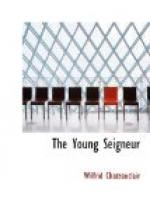In dress, in manners, we should be common-sense, tasteful and fearless, and in the development of our territory energetic and full of hope. “Believe me, sir, we shall yet learn how to have bright fire-sides on the shores of the Arctic.”
“And where is our world-work?” Chrysler asked, like one awakening.
“Wherever there is world-work undone that we can reach to do.”
“Think,” cried he, finally, “of a country that lives, as I am suggesting, on the deepest and highest principle of the seen and the unseen—what has been the aspiration of the lonely great of other nations, the clear purpose of all is this: what have been the virtues of a few in the past, determined here to be those of the whole; and every citizen ennobled by the consciousness that he is equally possessed of the common glory!”
“It can be done! Heaven and earth tell us that all is under laws of cause and effect, and that this, which has been once, can be made universal. I hear the voice of Science, ’It can be done. It can be done!’ I hear the voice of Duty, ‘It must be done!’ Inextinguishable voices!!”
“It comes to me so vividly that I almost point you to that sunrise and say, ’See yon beautiful city whose palaces and churches tower with the grace and splendors of all known architecture; those rural plains and vales of park and garden, where every home nestles so as one could not conceive it more lovely; that race of heroes and goddesses in strength and thought; those proud tablets and monuments of national and international honor and achievement and blessing.’ And if any say, ’How can we attain to that greatness?’ I would write him this amulet: ’Begin at the POSSIBLE!’”
The patriot ended, and when he had finished, Chrysler exclaimed:
“Work it out, Haviland! If a convert is any use to you, take me over and send me forth. It’s a noble scheme. But, for Heaven’s sake, fortify yourself. How many proselytes do you expect in the first hundred years?”
“You forget,” replied Haviland. “I have always this faithful little legion of Dormilliere. Has not Lareau said,” and he smiled half in joke, half seriously, “that we are a people of ideals.”
They returned to their fishing in silence, broken by a meditative query now and then from Chrysler, but no movement of curiosity from the Bonhomme.
CHAPTER XXVII.
JOSEPHTE.
“Sister Elisa,” lisped Rudolphe, the tiny boy. (In the garden the children of the farmer of the domain, and of Pierre, were playing together.) “Mr. Ch’ysl’ has told me he was a Canadian.”
“Did he say so, mon fin?” asked motherly ten-year-old Elisa, picking a “belle p’tite” flower for the little fellow, whom she held by the hand.
“He’s not Canadian,” put in the large boy, Henri, with contempt befitting his twelve years of experience. “Because he doesn’t speak French. He’s an English.”




